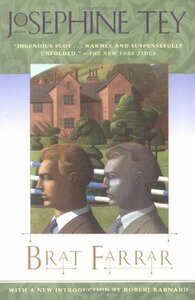Take a photo of a barcode or cover
This year I started reading a mystery series by Nicola Upson that features Josephine Tey as the female lead as she and her friend Archie solve mysteries. The one I finished just before I started Brat Farrar, the second in the Upson series Angel with Two Faces was so very similar to Brat Farrar. They are both about twins, both about mysterious, possibly suicidal deaths, both set in a similar setting (the south of England) and both were very much horsey kinds of tales
I really enjoyed Brat Farrar. Although I'd figured out the mystery very early on, I was still compelled to read onward because I wanted poor Brat to come out of the story with some sort of hopeful ending, and it just didn't seem as if he could manage it.
Both stories were, also, very psychological rather than procedurally complex. I much prefer my mysteries focusing on the people's motivations and thoughts than the murders so I was quite happy about it.
I really enjoyed Brat Farrar. Although I'd figured out the mystery very early on, I was still compelled to read onward because I wanted poor Brat to come out of the story with some sort of hopeful ending, and it just didn't seem as if he could manage it.
Both stories were, also, very psychological rather than procedurally complex. I much prefer my mysteries focusing on the people's motivations and thoughts than the murders so I was quite happy about it.
dark
mysterious
tense
medium-paced
Plot or Character Driven:
Character
Strong character development:
Yes
Loveable characters:
Complicated
Diverse cast of characters:
N/A
Flaws of characters a main focus:
Yes
Very well written, manages to portray the English upper class life very well. The ending could be more explicit.
Minor: Murder
The Bizarro World version of [b:The Talented Mr. Ripley|769004|A Pleno Sol El Talento de Ripley|Patricia Highsmith|http://www.goodreads.com/images/nocover-60x80.jpg|1817520], this is completely delightful and cozy. Brat Farrar is an orphan who is convinced by a stranger to assume the identity of the lost son of a charming family who for generations have lived in a small estate in the countryside. The novel is set in England in the late 1940s, and secrets and murder feature in the plot. However, the most compelling thing about this book is how hard the reader roots for Brat and the family to both somehow get what they desire.
Side note: I read this in an old, beat-up hardback copy from the library, and the old book-ness of it added to the appeal.
Side note: I read this in an old, beat-up hardback copy from the library, and the old book-ness of it added to the appeal.
very smart mystery/family study of an english family and interloper who pretends to be a long-lost member for the inheritence. which is an incredibly reductive statement and the book is really so much more. the only trouble with reading classics like that is that a billion books/tv shows/etc. have ripped them off in the interim, so some of the suspense was killed. really admirable though, and makes me want to read more tey.
A masterpiece of characterization"","" both of humans and of horses. A delicious read.
Fun, quick read even though I saw the ending coming from a mile away.
challenging
dark
mysterious
tense
medium-paced
Plot or Character Driven:
Character
Strong character development:
Yes
Loveable characters:
Yes
Diverse cast of characters:
No
Flaws of characters a main focus:
Yes
An audio reread of a book that I loved as a teenager. I read all Tey's books with the exception of The Daughter of Time when I was about sixteen. This was my favourite and so far I'mfinding the story to have quite a different angle to the way I remember it.
An impostor pretending to be the long-lost, presumed-dead son and heir of a well-to-do family becomes fascinated with finding out what really happened to the boy whose place in the world he has stolen. The premise of this book is fascinating, the characters and settings are vividly drawn, the mystery is detailed and confounding, the various setpieces are exciting in and of themselves and also contribute thematically to the mystery, the story raises interesting moral dilemmas; in short, the execution is nearly flawless, with one glaring, frustrating issue (see spoilers).
I was already enthusiastically recommending this book to people before I'd finished and realized that the mystery is never fully solved. There is enough detail to get a rough sketch of the crime, but some of the key details are never explained, notably how the murderer established his alibi ("I can be in two places at once," he taunts, and when you put in a tease like that, how can you not explain it?) This is clearly an intentional choice, because of places in the narrative where the author becomes suddenly vague ("he explained his theory of the crime" type description without saying what the theory is), which I assumed at the time was to give the reader a chance to figure it out, and I duly played along and tried my best to think of the solution*. I wouldn't have bothered if I'd known the author also didn't have a solution!
I'm so puzzled and frustrated by this choice. I reject the explanation that the details are unimportant because the book is really about the character's moral dilemma of whether to come forward with the information. Knowing what the information was (at least 'knowing' to the extent that the main character knew, or supposed) would not have diminished THAT story, and in fact, would have enhanced it since I wouldn't be so distracted trying to come up with "the answer" as if it were a traditional mystery. Even an unsatisfying explanation or unconfirmed speculation would have been better than hiding the theory from the reader. I don't require that all mysteries be totally solved, or that Hercule Poirot come out at the end and explain everything, but ESPECIALLY if you're never going to do a reveal, why be so carefully vague about what one of the characters thinks? It is certainly true to life that some things are never fully explained, but you cannot argue that it is true to life to be abruptly shut out from certain thoughts of the POV character whose mind we are normally in. That's a deliberate artistic choice that is dumb. I SAID IT
The reason I'm so upset by this is that everything else is so good, and thinking about it was so fun. The book provides exactly enough detail about the crime to make you feel like you can solve it, and if you could have (or could have confirmed if you were 'right' or 'wrong' or at least if you agreed with Brat)--had there been even a nominal explanation for Simon's alibi--this would have been one of my favorite mysteries of all time.
* If you want the details, the partial explanation that suggested itself to me based on Brat's apparent line of thought was that Simon fudged the time of the murder by impersonating Patrick to the passing shepherd, Abel, and then ran to the blacksmith's to establish his alibi for the rest of the afternoon. Because Patrick was seen around 2pm, the police place his disappearance somewhere between 2 and 6 (when he didn't show up to dinner), but if Patrick at 2pm was really Simon, the murder might have been done in the morning. I may be primed to think of mistaken identity because of Brat's storyline, the fact that the children were twins (though not identical), and Agatha Christie conventions; but this is the only explanation I can think of for why Brat has a moment of realization when remembering Miss Parslow saying "Simon hates Tanbitches". In that conversation, Miss Parslow took Brat for Simon because he was where she expected Simon to be, so I figure that perhaps Abel took Simon for Patrick because he had never seen Simon in Tanbitches but saw Patrick there often. If this isn't the solution that is intended, it's unclear to me why thinking back on the Parslow conversation should have been revelatory for Brat.
While this theory has the feeling of neatness, it doesn't actually make sense. Simon still would have had to be away from the blacksmith's the whole morning and, indeed, until shortly after Abel sees him on the hillside. He can't actually be in two places at once. At best, this is a bunch of confusing rigmarole merely to SLIGHTLY fudge the presumed time of death, while still requiring the murderer to be absent from his alibi at the beginning of the fake time of death window! Given the simplicity of the actual murder (coshed on the back of the head and thrown in a quarry), the lack of a timetable around Simon's planting the fake suicide note (it might have been any time through the night as it wasn't found until the next morning), and the lack of a specific start time on Simon's blacksmith alibi, this mistaken identity aspect is completely unhelpful and unnecessary, which is maybe why Tey didn't confirm it happened, but I also can't think of an alternate explanation for the order and prompting of Brat's undescribed revelations. To the extent that we know the basic facts, no such revelation is needed. By the time he is having these revelations, Brat is sure that Simon is the murderer, he just doesn't know how.
If anything, the only revelation he needs is to remember Abel mentioning the quarry as the potential place to find Patrick's body (explaining the legitimately cool aspect that Simon isn't 100% sure that Patrick might not have escaped), but the hints we're given as to Brat's line of thought don't point to the quarry. They point to a bunch of other stuff that turns out not to be relevant.
Honestly, if the book hadn't STRONGLY IMPLIED that there was a twist and "something to figure out" by conspicuously obscuring certain (irrelevant?) things, I would have been satisfied that the mystery was solved, and I wouldn't have cared that it was obvious (who did it, I mean) because it made sense and the book wasn't really about figuring it out. It's only because of the implication that THERE'S SOMETHING TO FIGURE OUT that makes people like me, and people who complain that the solution was "too obvious," frustrated and disappointed. It's the unnecessary building of expectations.
Spoiler
I was already enthusiastically recommending this book to people before I'd finished and realized that the mystery is never fully solved. There is enough detail to get a rough sketch of the crime, but some of the key details are never explained, notably how the murderer established his alibi ("I can be in two places at once," he taunts, and when you put in a tease like that, how can you not explain it?) This is clearly an intentional choice, because of places in the narrative where the author becomes suddenly vague ("he explained his theory of the crime" type description without saying what the theory is), which I assumed at the time was to give the reader a chance to figure it out, and I duly played along and tried my best to think of the solution*. I wouldn't have bothered if I'd known the author also didn't have a solution!
I'm so puzzled and frustrated by this choice. I reject the explanation that the details are unimportant because the book is really about the character's moral dilemma of whether to come forward with the information. Knowing what the information was (at least 'knowing' to the extent that the main character knew, or supposed) would not have diminished THAT story, and in fact, would have enhanced it since I wouldn't be so distracted trying to come up with "the answer" as if it were a traditional mystery. Even an unsatisfying explanation or unconfirmed speculation would have been better than hiding the theory from the reader. I don't require that all mysteries be totally solved, or that Hercule Poirot come out at the end and explain everything, but ESPECIALLY if you're never going to do a reveal, why be so carefully vague about what one of the characters thinks? It is certainly true to life that some things are never fully explained, but you cannot argue that it is true to life to be abruptly shut out from certain thoughts of the POV character whose mind we are normally in. That's a deliberate artistic choice that is dumb. I SAID IT
The reason I'm so upset by this is that everything else is so good, and thinking about it was so fun. The book provides exactly enough detail about the crime to make you feel like you can solve it, and if you could have (or could have confirmed if you were 'right' or 'wrong' or at least if you agreed with Brat)--had there been even a nominal explanation for Simon's alibi--this would have been one of my favorite mysteries of all time.
* If you want the details, the partial explanation that suggested itself to me based on Brat's apparent line of thought was that Simon fudged the time of the murder by impersonating Patrick to the passing shepherd, Abel, and then ran to the blacksmith's to establish his alibi for the rest of the afternoon. Because Patrick was seen around 2pm, the police place his disappearance somewhere between 2 and 6 (when he didn't show up to dinner), but if Patrick at 2pm was really Simon, the murder might have been done in the morning. I may be primed to think of mistaken identity because of Brat's storyline, the fact that the children were twins (though not identical), and Agatha Christie conventions; but this is the only explanation I can think of for why Brat has a moment of realization when remembering Miss Parslow saying "Simon hates Tanbitches". In that conversation, Miss Parslow took Brat for Simon because he was where she expected Simon to be, so I figure that perhaps Abel took Simon for Patrick because he had never seen Simon in Tanbitches but saw Patrick there often. If this isn't the solution that is intended, it's unclear to me why thinking back on the Parslow conversation should have been revelatory for Brat.
While this theory has the feeling of neatness, it doesn't actually make sense. Simon still would have had to be away from the blacksmith's the whole morning and, indeed, until shortly after Abel sees him on the hillside. He can't actually be in two places at once. At best, this is a bunch of confusing rigmarole merely to SLIGHTLY fudge the presumed time of death, while still requiring the murderer to be absent from his alibi at the beginning of the fake time of death window! Given the simplicity of the actual murder (coshed on the back of the head and thrown in a quarry), the lack of a timetable around Simon's planting the fake suicide note (it might have been any time through the night as it wasn't found until the next morning), and the lack of a specific start time on Simon's blacksmith alibi, this mistaken identity aspect is completely unhelpful and unnecessary, which is maybe why Tey didn't confirm it happened, but I also can't think of an alternate explanation for the order and prompting of Brat's undescribed revelations. To the extent that we know the basic facts, no such revelation is needed. By the time he is having these revelations, Brat is sure that Simon is the murderer, he just doesn't know how.
If anything, the only revelation he needs is to remember Abel mentioning the quarry as the potential place to find Patrick's body (explaining the legitimately cool aspect that Simon isn't 100% sure that Patrick might not have escaped), but the hints we're given as to Brat's line of thought don't point to the quarry. They point to a bunch of other stuff that turns out not to be relevant.
Honestly, if the book hadn't STRONGLY IMPLIED that there was a twist and "something to figure out" by conspicuously obscuring certain (irrelevant?) things, I would have been satisfied that the mystery was solved, and I wouldn't have cared that it was obvious (who did it, I mean) because it made sense and the book wasn't really about figuring it out. It's only because of the implication that THERE'S SOMETHING TO FIGURE OUT that makes people like me, and people who complain that the solution was "too obvious," frustrated and disappointed. It's the unnecessary building of expectations.
I really enjoyed this. I found the premise intriguing and was fascinated to see how it all worked out. Really, really good. Once again, I'm annoyed that it took me this long to get around to reading it considering how long it's been on the to read pile (although by the standards of some of the to-read pile's long term residents I haven't done too badly). Its hard to talk about the plot without giving it away, but it's a bit twisty and turny and you wonder where your sympathies ought to lie. I need to read more Josephine Tey.






